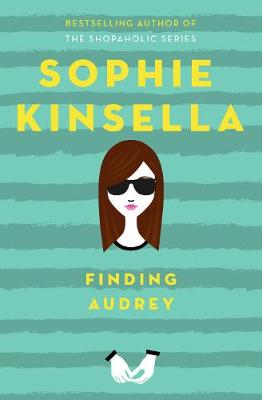3.5*
My favorite thing about this book is that it doesn't bullshit. It doesn't paint an unrealistic picture of what it is like to need help, to find help, and how help is easily available to the privileged, but not necessarily everyone else. This line is so accurate, it hurts:
"The first question they ask when you arrive isn't 'How do you feel?' It's 'Do you have insurance?'"
Thing is, that is how so many places really are. It's a money maker, first and foremost. Help is secondary. But Audrey does find a doctor to help her, so that is good. (Also, not at all a spoiler, it's in the synopsis.) I think Audrey relates to her counseling in a way that felt quite realistic to me. She wonders from time to time if she should just be like "nah, I'm good", and of course, she wonders if any of it is worth a damn (which, if you're anything like me, you totally have wondered). There's also a moment where Audrey says her mom worries about being blamed, which is an experience I have had too.
"I think she's secretly poised for the day Dr. Sarah says 'Well Audrey, of course it's all the fault of your parents.'"
Audrey's family is also kind of a hot mess. Fine, not kind of, is. Her mom is dealing with what is probably her own particular brand of mental illness, though she doesn't appear to be diagnosed with any in the book, it's rather clear that something is going on. Felix, her younger brother, is the actual sweetest thing ever though. And it's clear that despite all their issues, they do genuinely all care about each other as a family.
Some other things I loved? Sure!
- Real talk about meds. Seriously, there is actual discussion about withdrawal effects. This nearly never happens in books, and damn, I was happy to see it here. Dr. Sarah actually tells Audrey about them, too! Can I hug Dr. Sarah? This is such a real thing for so many people, and it is consistently glossed over by medical personnel, and I am so grateful to see it in this book. There's also discussion about the perils of one stopping one's medication when they feel "better", which is a super common phenomenon that isn't discussed nearly enough.
- Misconceptions by friends/family/etc are discussed. There is a situation where a friend's parent was afraid to let the kid talk to Audrey again because "Mum said you must be bipolar" and "Bipolar people can become violent". Audrey shuts this shit down, on so many levels. Because what even, right? Well, these stereotypes absolutely do exist, so it is awesome that the book addressed them- and negated them!
- There's talk about setbacks, and how there is no real "cure"- but that doesn't mean there isn't hope, and getting better, and living your life. I think the message was both realistic and positive, which is a hard balance. This book also uses humor (which you can read about in Vlora's post here) which I think works well to show that yes, people with mental illness can have fun, be funny, and still struggle.
A Few Things I Didn't:
- Audrey's recovery seemed too quick/easy. I am not saying that it was, but it felt that way. I know that she was also recovering before we pick up her story, but she goes from basically agoraphobic to Starbucks wayyy too fast to feel authentic to me.
- Linus... I am on the fence about him, basically. Like, I am not saying he "fixed" her, because he didn't, but I don't love that he was the catalyst for her to want to change. Like, had some dude never waltzed into her brother's life, Audrey'd still be in her room? I don't know, it doesn't quite sit well with me. And sometimes I liked Linus, but other times he was just so damn clueless. Which, I guess is realistic, but that doesn't mean I have to like it.
- There were some.... little things. Things that maybe wouldn't have bothered anyone else? Like, they talk about having chickenpox... but I don't think that is still a "thing"? (Actually, upon further research, apparently the UK does not actively vaccinate healthy people against chickenpox. Here, it is a requirement, hence my confusion. Well, the more you know, right? Now you can be not confused!) And there's a bit where Audrey talks about her parents not even knowing how to double-click, or open a picture on Facebook and I am like... these people are 38 years old, not 108, I am pretty sure they know how to operate a Word document. This could just be me, as a person not much younger than that, being a bitter old person though ;)
Bottom Line: I felt like this was an overall good representation of mental health, including some of the problematic aspects in the treatment of mental illness in general. Audrey felt like a realistic character, and her struggles were quite authentic.
*Copy provided by publisher for review
